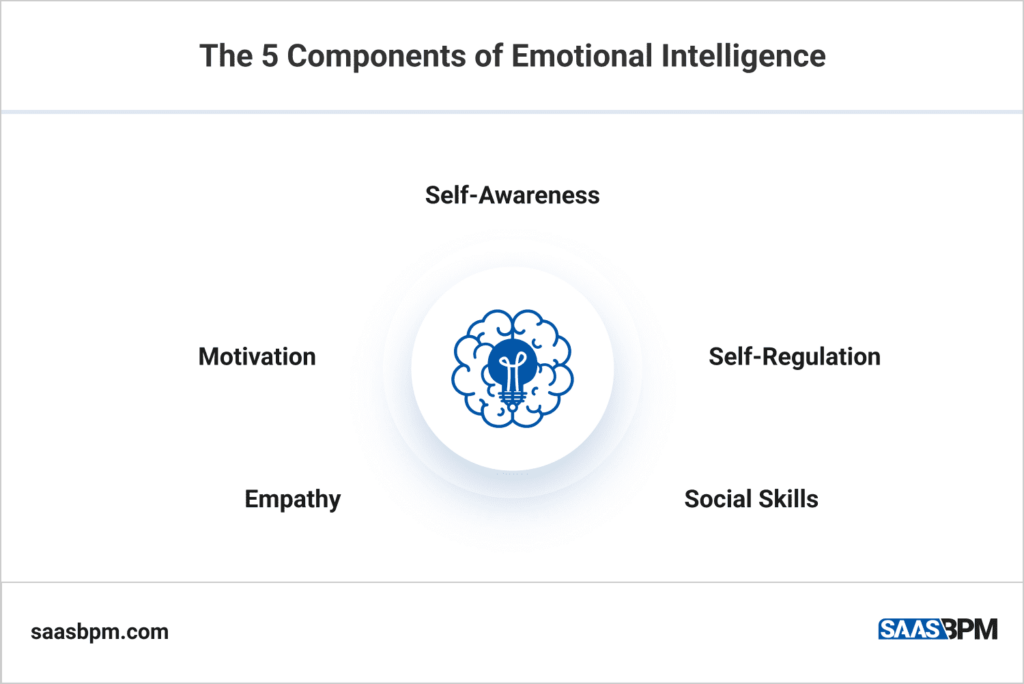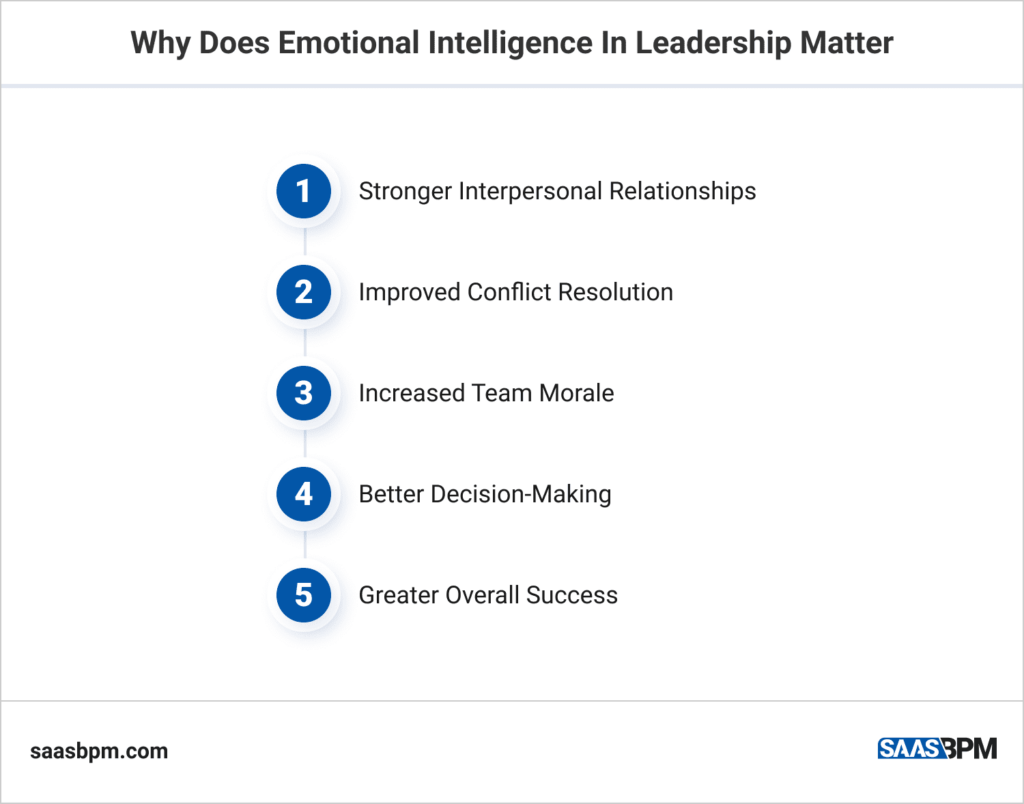Have you ever wondered how some leaders are naturally more successful in business than others? Sure, some technical skills and experience can contribute to their growth. But have you considered the importance of emotional intelligence in leadership?
Emotional intelligence (EQ) is the ability to understand and manage emotions. And studies have shown that leaders with high EQ tend to be more effective in managing teams and driving success. In fact, 90% of top performers have high EQ.
Yet, despite the importance of emotional intelligence in leadership, only42% of companies provide specific training to improve it in their organizations. This means many leaders may miss out on the opportunity to improve their EQ and unlock their full potential as business leaders.
In this article, we’ll dive deeper into the role of emotional intelligence in leadership and explore the benefits of cultivating this skill.
What Is Emotional Intelligence In Leadership?

Emotional Intelligence in leadership refers to the ability to recognize, understand, manage, and express one’s emotions effectively and also to understand the emotions of others. It is essential for leaders as it enables them to connect with their team members and manage relationships effectively. Leaders with high EI understand that emotions can be a driving force in the workplace and can control their emotions in a way that prevents them from negatively affecting their decision-making.
Emotionally intelligent leaders are not only in touch with their own emotions but also their team members’ emotions. They can read social cues and use this knowledge to build trust, establish connections, and inspire their team. In addition, leaders with high emotional intelligence understand that people are diverse and unique, which means they respond to situations differently. Therefore, emotionally intelligent leaders tailor their approach accordingly to meet the needs of their team.
Emotionally intelligent leaders are also good communicators. They can communicate their thoughts and feelings clearly and empathize with others. As a result, they can effectively manage conflicts and find ways to collaborate with their team.
The 5 Components of Emotional Intelligence
The 5 components of emotional intelligence, as identified by Daniel Goleman, are as follows:

1. Self-awareness
Emotional intelligence is an essential skill. It allows us to understand our emotions and those around us. One of the signs of emotional intelligence is self-awareness. Without self-awareness, one may not be able to handle situations appropriately and maintain healthy relationships.
People lacking emotional intelligence may struggle with self-management and have difficulty regulating emotions. Self-awareness is the key to identifying and understanding these emotions, allowing individuals to control them productively and healthily. By being self-aware, we can better understand our feelings and tendencies, improving our emotional intelligence in the workplace, and our relationships with those around us.
2. Self-regulation
Self-regulation refers to a person’s ability to manage emotions and behaviors in a given situation. Individuals who have developed this ability can control their impulses, thoughts, and feelings, even in stressful circumstances.
Some examples that illustrate the importance of self-regulation in emotional intelligence are:
- Managing emotions. Emotionally intelligent people can manage their emotions effectively without letting them overwhelm their thoughts and actions. Self-regulation allows individuals to recognize and deal with negative emotions, like anger or frustration, instead of reacting impulsively.
- Impulse control. Self-regulation helps individuals resist temptations and impulses that could undermine their long-term goals. This includes resisting the urge to lash out at others or engage in self-destructive behaviours.
- Setting boundaries. Emotionally intelligent people can set healthy boundaries for themselves and others. This means they know when to say “no,” to protect their needs and interests and communicate effectively without becoming overly emotional or defensive.
3. Motivation
Motivation is essential to emotional intelligence in the workplace, which refers to recognizing, regulating, and managing our emotions and behaviours. As individuals, we encounter situations that can evoke various feelings.

Through self-motivation, we can effectively address these emotions, especially the negative ones, without letting them overwhelm us. This ability allows us to remain calm and composed in challenging situations, enhancing our overall well-being.
High levels of motivation also means being socially aware and practicing empathy and critical emotional intelligence skills. Social awareness helps individuals understand and perceive the emotions of others and the environment around them.
This skill enables us to respond appropriately to situations, making us more effective in our interactions with others. Empathy is also vital to staying motivated as it allows us to understand and connect with other people’s emotions, inspiring us to regulate ourselves.
When we can see things from the perspective of others, we are less likely to react impulsively, making us better communicators and decision-makers.
4. Empathy
Empathy is the ability to understand and relate to the emotions and experiences of others. It allows individuals to develop better relationships with those around them, whether in the workplace, at home, or in any other setting. By being empathic, people can understand the needs and concerns of others better and can respond more appropriately and effectively.
Also, empathy allows us to connect more deeply with others and build stronger bonds with them as we develop our emotional intelligence. We can better put ourselves in their shoes and see things from their perspective. This is particularly important when conflict arises, as empathy allows us to approach these situations with greater understanding and compassion. By identifying and acknowledging the emotions of those involved in a conflict, we can better work towards a resolution that satisfies all parties involved.
Emotional intelligence in leadership develops when business managers recognize their own emotions and the emotions of the team members in the company. As a result, they can put themselves in someone else’s shoes and understand the feelings they are experiencing.
5. Social Skills
Social skills enable people to navigate various social situations and interact positively with others easily. Communicating effectively, listening actively, and maintaining healthy relationships are critical components of emotional intelligence.
One of the core aspects of social skills, when it comes to emotional intelligence in leadership, is having a positive outlook and passing it onto your employees, clients and stakeholders. This involves being optimistic, resilient, and having a healthy attitude toward life. By having a positive outlook, individuals can better cope with challenges and setbacks that they may face, maintain more beneficial relationships, and have better emotional regulation.
In addition to having a positive outlook, being able to resolve conflict effectively is another essential social skill that is strongly linked to emotional intelligence. Conflict is a natural part of life, and it is critical to handle it constructively and effectively. This involves listening actively, communicating effectively, and finding common ground with others. Without these skills, conflicts can often escalate and cause hurt, frustration, and pain.
Some examples of how Social Skills is a core component of Emotional Intelligence are:
- Establishing and maintaining healthy relationships with people is a fundamental aspect of social skills.
- Listening and communicating actively with others is critical in developing and maintaining healthy relationships.
- Resolving conflicts constructively and with empathy is crucial to maintaining good relationships with others.
- Good leadership skills can lead to better communication, collaboration, and teamwork.
- People with strong social skills tend to be more successful personally and professionally.
Reasons Emotional Intelligence Is Important In Business Leadership
Here are five reasons why emotional intelligence in leadership is so important:

Stronger Interpersonal Relationships
Solid interpersonal relationships help build trust and respect at work, which can be incredibly beneficial when motivating your team and achieving your goals. The key is to develop a leadership style that emphasizes communication and collaboration.
You can build stronger relationships by maintaining an open dialogue with your employees and encouraging them to share their ideas and concerns. In addition, take into account the power of nonverbal communication. Your body language can convey much about how you feel and what you’re thinking, so it’s essential to be aware of your posture, facial expressions, and other nonverbal cues.
Remember, the more you invest in building strong interpersonal relationships, the more effective you’ll be as a leader.
Improved Conflict Resolution
As a leader, it’s essential to recognize that how you handle those conflicts can significantly impact the success of your team and organization. Emotional intelligence is crucial in conflict resolution because it allows you to understand better your emotional responses and those of your team members.
By being aware of your emotions and how they influence your behavior, you can adequately navigate tense situations and respond beneficially to everyone involved. Improved conflict resolution creates a more positive work environment and promotes greater productivity and business outcomes.
Increased Team Morale
Leaders who know how to develop emotional intelligence prioritize the well-being and satisfaction of their employees. This way, they create a more positive and productive work environment, which in turn can significantly impact overall business success.
When team members feel valued and supported, they are more likely to go the extra mile and deliver top-quality work, which means better results for the company. So, if you want to be a successful business leader, it’s crucial to prioritize the overall morale of your team and foster an environment that encourages growth, teamwork, and positivity.
Better Decision-Making
Influential leaders constantly seek to enhance their leadership development by improving their decision-making skills. This may involve getting input from others, considering all available information, or simply taking a step back to think things through.
And it’s not enough to make good decisions – a leader must also effectively communicate these decisions to their team in a way that inspires confidence and trust. After all, a decision is only as good as its execution.
Greater Overall Success
Those with high levels of emotional intelligence are typically better equipped to navigate challenging situations, communicate effectively, and build strong relationships with team members, clients, and stakeholders. But the benefits of emotional intelligence extend far beyond the office walls.

As we mentioned above, research shows that individuals with higher levels of emotional intelligence also enjoy more success in their personal lives. By understanding emotions, managing stress levels, and communicating effectively, emotionally intelligent leaders can make more informed decisions and positively change all aspects of their lives.
Final Thoughts
In conclusion, emotional intelligence is an essential trait for effective business leadership. Managers who are well-versed in EI are better equipped to connect with their team members, understand their needs, and motivate them toward common goals. Studies have shown that emotional intelligence positively impacts employee performance, job satisfaction, and well-being.
As businesses navigate an increasingly complex and diverse landscape, leaders prioritizing emotional intelligence will be better positioned to succeed. By investing in emotional intelligence training and development, business leaders can create more inclusive and supportive workplaces that foster growth and success for all.

Author bio: Josef Mohamed is a Content Marketer, SEO strategist, and Web Designer who writes about Marketing, Technology, and Photography. He founded Josefmohamed.com, where he shares his knowledge and expertise.

